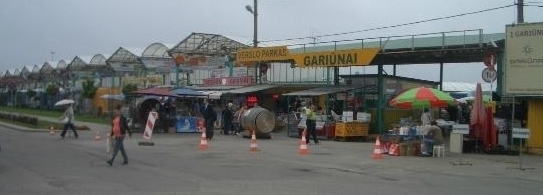A Trip to the Black Market
I was told many times that no work on smuggling in the EU would be complete without a trip to Gariunai Market-- the premier place in Lithuania to buy all your Panasomic TVs, Adidads sneakers, Dolce and Gabanana purses, cars that may or may not still have a previous owner, gold chains with bonus green rings, and, or course, premium cigaretės.
 It’s a veritable heaven of illegal goods just a quick twenty minutes southwest of the city and had been on my to-tourist list since I arrived. The market itself is a bunch of makeshift stalls on a pot-holed road marked off by a lackluster chain link fence, but houses more vendors than any american mall I’ve ever been to. It once claimed to be the largest market in Eastern Europe, but I think that claim to fame has now been taken over by the marketplace in Ryga. The face of the vendors has shifted over time-- once staffed by Chinese vendors and now almost exclusively Belarusian and Russian-- but the theme has stayed consistent. It is a place to buy everything, whether it be legal, semi-legal, questionably legal, or unquestionably illegal.
It’s a veritable heaven of illegal goods just a quick twenty minutes southwest of the city and had been on my to-tourist list since I arrived. The market itself is a bunch of makeshift stalls on a pot-holed road marked off by a lackluster chain link fence, but houses more vendors than any american mall I’ve ever been to. It once claimed to be the largest market in Eastern Europe, but I think that claim to fame has now been taken over by the marketplace in Ryga. The face of the vendors has shifted over time-- once staffed by Chinese vendors and now almost exclusively Belarusian and Russian-- but the theme has stayed consistent. It is a place to buy everything, whether it be legal, semi-legal, questionably legal, or unquestionably illegal.
I’ve been spent a lot of my time here indoors researching smuggling, but the market was my first experience seeing the black market in action. It was a clever mix of seemingly legal goods in the open with promises of illegal goods underneath. As I walked through the market trying to figure out the connection between half used perfume bottles and broken electronics being sold at one stall, I heard babushkas rushing behind me, whispering “cigaretės” to no one in particular.
These babushkas (used to refer to elderly women in Lithuania as well as other neighboring post-soviet countries and Russia) are some of the biggest peddlers of illegal cigarettes in Lithuania and outdoor markets like Gariunai are some of their most popular places for setting up business. They’re drawn to the illicit markets to make money however they can, and they frequently see very few consequences for their actions. They don’t sell enough illegal cigarettes to go to jail and the social net in Lithuania limits them from paying fines that would put them below the minimum standard of living. The result is a phenomenon known as “millionaire babushkas” because many of these women have been caught so many times they’ve accrued a small fortune in criminal sanctions. They keep returning to the market for the same reasons that lured them in in the first place, a promise to make money.
It’s hard to imagine these sweet, bent-over, elderly women being hardened criminals, but it’s harder still trying to imagine a solution to the problem. Putting them in jail seems especially cruel, but throwing more sanctions at them doesn’t seem to be doing much either. There is obviously a balance that can and should be struck, but sometimes the economic drivers of crime appear too great to overcome.
I decline the offer to buy any cigarettes from the babushkas, no matter how cheap and leave the market empty handed.